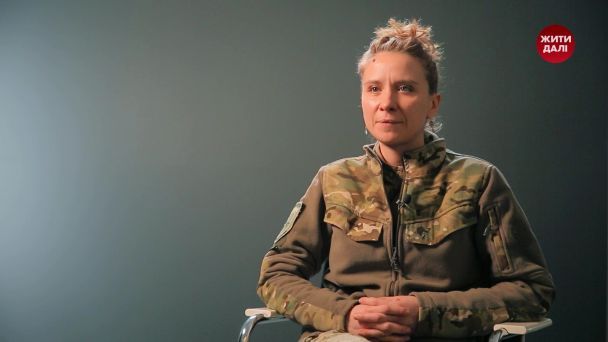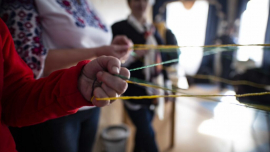As of the end of 2022, 154 criminal cases of sexual violence committed by the Russian military were officially opened in Ukraine.
As of the end of 2022, 154 criminal cases of sexual violence committed by the Russian military were officially opened in Ukraine.
"I used to think that I was a pretty strong person, that I could survive anything, but this event that happened to me is some kind of maximum humiliation in front of myself, not even in front of anyone."
Alisa Kovalenko is a Ukrainian filmmaker who traveled to Donbas in April 2014 and became one of the first victims of sexual violence by the Russian military.
"I went there with my boyfriend, a French journalist I was dating at the time. I tried to record everything that was happening there. I went to film our Ukrainian checkpoint. One day I had to return to Donetsk, and there was no public transportation then, only taxi drivers or local drivers. And at the first checkpoint we were stopped and asked by a taxi driver: "Who are you driving?". And he said: "She's with the Ukrainian military."
As of the end of 2022, 154 criminal cases of sexual violence committed by the Russian military had been officially opened in Ukraine. However, experts claim that there are many more victims.
Alisa recalls being pulled out of the car and taken for hours of interrogation: "I was in a numbness, I realized it was over. They were very surprised why I didn't cry and didn't react to the fact that they were beating me on the legs. I was in an emotional numbness. They began to scare me with Stefan, saying they would take him "to the basement". They said they would break his fingers, cut his ears, and so on."
Late at night, one of the Russian soldiers took the girl to an unknown apartment, where he ordered her to wash and put her bloody clothes in a bowl of water: "He didn't let me get dressed, just handed me a towel. He grabbed me by the shoulders, sat me down next to him and said: "Talk to me, I'm lonely, we're not animals." Like, we came here to help the brotherly people and all that. At the same time, he was cleaning his gun in front of me, enjoying the fact that he had power."
"War-related sexual violence is not only rape," says Maryna Lehenka, a legal advisor at La Strada Ukraine, "There were also cases of forced undress, forced humiliation, including nakedness. Women were forced to kneel. There were sexual assaults, when women in hiding were forced to choose the one whom the occupiers would rape. They exerted sexual pressure on these women."
"It was already late when he said we had to go to bed," says Alisa Kovalenko, "and he said he would go to bed with me so that I wouldn't run away. I begged him not to, I told him where I would really run away to, he had all my documents. He agreed at first, and I was already falling asleep when he came and tried to rape me, and I started crying..." ..................................
Filmmaker fights for Ukraine, driven by memories of sexual abuse
WARSAW, 18 July(Reuters). When Alisa Kovalenko signed up to fight for Ukraine, she says she was motivated by anger over Russia's invasion of her home and memories of the sexual assault she suffered while fighting Moscow-backed separatists eight years ago.
Thin and vivacious with piercings sticking out of her ears, she told Reuters her story in the Kyiv suburbs where she lives with her father when she is not fighting as a soldier near Kharkiv.
She said she was working on a film about the conflict in eastern Ukraine's Donetsk region in 2014 when she was stopped at a separatist checkpoint, taken for questioning, and then sexually assaulted by a Russian officer in a nearby apartment.
Russian authorities did not immediately respond to a request for comment on Kovalenko's story. But Moscow has regularly denied sending officers and troops to the separatists at the time and has since rejected all allegations that its forces committed acts of sexual violence, calling them lies and propaganda.
Kovalenko said that in 2014, she was interrogated for hours and accused of being a Ukrainian sniper before an officer took her to an apartment and forced her to strip naked in a bathroom.
She said she remembered crying when he asked her to lie down on the bed and then tried to rape her before falling asleep. After repeated interrogations, she added, she was released a few days later.
"I think I was so afraid, it was like an animal... animal fear. I had never felt such fear before.
"I promised myself that if the war spreads to the whole of Ukraine, I would fight not with a camera, but with a rifle."
"I WASN'T THAT scared eight years later, when Russia actually sent tens of thousands of soldiers across the border in its 'special military operation,' the memories came flooding back.
The prospect of repelling a full-scale invasion was terrifying. But then she remembered what she had already experienced.
"It (sexual violence) broke me. But at the same time, I was not afraid of anything after that," she said.
"When I went to war. I was not so afraid." According to Kovalenko, who was born in the eastern city of Zaporizhzhia, the memories of the attack gave rise to a mixture of motivations.
"This is one factor that made me make this decision... one thing in a list of factors. All of them played a role in trying to protect myself from these things - not just to protect myself, but to protect all the people, my family. "
Since then, Alice has spent months on the front lines under fire, miles away from her husband and young son in France.
She lost one close friend in the fighting. "It's absolutely unbearable... you become a family with some of your comrades because you spend so much time together," she said.
When not fighting, soldiers talk about movies and music, smoke, share jokes and life stories.
According to many survivors of sexual violence, they prefer to remain silent for fear of retaliation from Russia and stigmatization by their Ukrainian neighbors.
But she appeared in a play about her ordeal before the invasion and now speaks freely about it.
"It's not only for me, but for others, and for Ukraine in general, because we need to talk about the crimes, about what Russia has done."




